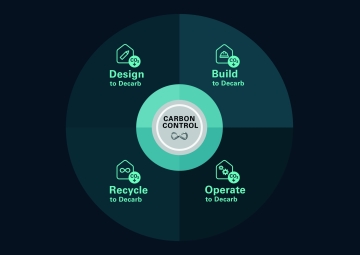A holistic view on decarbonization

The European Green Deal, with its goal to achieve climate neutrality by 2050, entails significant changes in the requirements for buildings. CO₂ becomes a new currency and the CO₂ value of a building represents a major factor in all future investments and tenders. In this, circularity plays a major role. Joep Römgens explains the importance of an holistic view on decarbonization.
The European Green Deal, with its goal to achieve climate neutrality by 2050, entails significant changes in the requirements for buildings. CO₂ becomes a new currency and the CO₂ value of a building represents a major factor in all future investments and tenders. In this, circularity plays a major role.
One of the broadcasts of the program "Doe Maar Duurzaam" (Just do it sustainably) on VTM was entirely devoted to this. And that a lot is already possible was demonstrated by the visit of presenter Christophe to our Innovation Campus, with Joep Römgens of Schüco as host.
Joep explains the importance of an holistic view on decarbonization: We are supporting our partners on the path to a CO₂-neutral future.
Schüco supports architects, fabricators, operators and investors to meet the increasing sustainability requirements imposed by law and demanded by clients, to find appropriate competitive solutions to increasingly complex tenders and to avoid investment risks. ´It starts with bringing all stakeholders to the table as early as possible.´ Schüco Carbon Control makes decarbonising the building envelope manageable. It enables building-specific CO₂ reduction in all phases of construction – planning, construction, operation and recycling. Through our comprehensive package, which brings together the CO₂-reducing products and services from Schüco, we actively assist those involved in construction to adhere to the climate policy aspects of building regulation requirements throughout the entire lifecycle of a building.
Discover more
On Schüco Carbon Control
Latest insights & stories

A Global Movement: The World Unites in a Pink Pledge for Clean and Sustainable Water
5,000 participants. 32 countries. €30,000 funds raised. And that's just the beginning.
Picture this: One step that sends ripples across the globe, transforming lives and creating waves of change. You might wonder, how can such a simple action for most of us have such a profound impact?

Sustainability and circularity in construction
Join us in transforming the future of construction, creating buildings that not only stand the test of time but also contribute to a healthier planet!

RainTunes: Shower scenarios for the soul
Light, hearing, smell, and touch: Together with experts, we have developed sensuous scenarios that turn showering into an individual experience. Whether you want to prepare for the day ahead or relax after working out. Whether you want to refresh after a day’s work or unwind at the end of the evening: RainTunes surprises with multisensory experiences.*
*Currently available only in Germany and Austria.